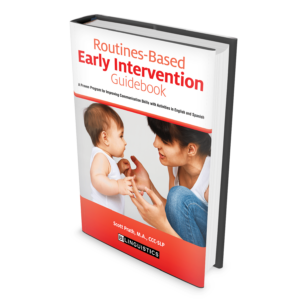I’ll be honest, I was supposed to write about using Non-Word Repetition tasks in the assessment process for today’s blog but something I read in the ASHA Leader this past week riled me up so I had to switch to talking about working with families.
There was an article in the ASHA Leader about working with families entitled, From Couching to Coaching, that really rubbed me the wrong way. As most of you know, in addition to being a speech-language pathologist, I am also the parent of a child with special needs.

I had twins who were premature and one of them suffered severe health issues in his first few months of life. The impact has been, and will be, lifelong. We’ve been in early childhood programs, preschool programs for children with disabililites, elementary school combinations of inclusion and resource, and now we are in a Life Skills program in middle school. I will tell you that having a child with significant disabilities and significant behavioral struggles is CHALLENGING.
So, when I put my parent goggles on and read the October 2018 ASHA Leader about working with families, I was disappointed.
I don’t feel the article’s tone moves the conversation forward. And truthfully, I think it actually risks perpetuating a misinformed idea that parents are lazy, uninterested, and don’t want to be involved.
Here was the author’s problem statement:
“The problem is, families may still be sitting on the couch, unengaged, expecting us to work exclusively with their young children…”
I don’t think it is fair of us as professionals to assume that families are sitting on the couch unengaged. As a parent of a special needs child, I can tell you that it is an all day, every day, all-in process of managing more appointments in a month than most kids have in their childhood. I will also say that I have had plenty of Early Childhood Intervention professionals come into my home to work with my child with me at their side eager to participate, and they have not engaged me.
Another statement the author made was:
“Other reasons parents may not directly involve themselves include:…a mismatch between the family’s and the practitioner’s expectations and priorities, which means the parent doesn’t see the need to be a part of or do what the practitioner does.”
Okay, guys, as a profession we have to recognize that mismatches result from many things. We can’t put this all on the parents!
Maybe we need to also consider these things to think about what WE can do differently:
- the clinician has not shared WHY they are doing what they are doing
- the clinician has made obscure requests without considering the family’s time, resources, or reality
- the clinician’s instructions for follow through between visits were not clear
- the clinician did not address what the parents were most concerned about.
These are just a handful of many reasons that have been collected through research on parent involvement.
Ten years ago, these very issues prompted us to write our very first book, Routines-Based Early Intervention Guidebook, so that we could work toward positive and productive relationships with families.
I recognize that the author’s overall goal was to increase parent involvement, and I appreciate that. I just don’t think the choice of words and overall sentiment moves our field in the right direction.
Here’s to YOU, SLPs and YOU, Parents. Let’s all work together to move our kids forward.
Sincerely,
Ellen Kester, Thomas’s mom, Ph.D, CCC-SLP






Thank you Ellen! Did you send a reply in to the Leader?
Hi Hope, I’ve drafted a response to the Leader but haven’t sent it yet. Thanks for encouraging me to do that!
Ellen,
Well said. I think you are absolutely right. In our field we are constantly working and re-working things to meet the needs of both the client and family. We can definitely improve parent communication taking the mystery out of the therapy. The wording definitely creates an imaginary divide between the two and I agree-it’s unnecessary. Like in therapy, lets focus on what is working well and continue to do that until we get the results that we are looking for.
Thanks, Catherine. I agree–so important to focus on what is working well.
Thank you! My sentiments lie with yours. Most parents are desperate for ideas to help their child. It is our job to equip them, not to judge them or to criticize their efforts.
So true, Stacey!
Ellen,
Thank you so much for this blog post! I have to say that I am regularly dismayed by the attitudes of SLPs towards families and then am further horrified when SLPs respond to that message in agreement. In all of my years, I’ve never met a family who didn’t care more about their child’s progress and well-being than every other team member combined. We as SLPs can save time by just assuming that parents are passionate about their kids and then learning the best ways to work with parents so they can engage at the level and in the way they want.
This is an issue very near to my heart and something that I discuss regularly in our trainings and I will continue to do so for as long as I have a platform.
Thank you for all that you do!
Thanks, Lisa. I appreciate that this is something you incorporate into your trainings! Keep up your good work!
Ellen,
Thank you so much for sharing this. I appreciated the reminder to address what the parents are most concerned about. That will help me guide the conversation during parent-teacher conferences next week!
Timely message. Hope the conferences go well.
Ellen,
I find myself constantly inspired by your determination to use our profession to make the world a better place. There is a great deal of social activism necessary for us to be effective at what we do, and it can be so exhausting. Thank you for taking the time to stand up for what is right on this forum and at your company.
Hi Juliana,
Thanks for that vote of confidence. I appreciate your comments. You are right that social activism can be exhausting but we all need to do it!
Good for you, Ellen, for following up and sending your response. I just read the article and saw your response. As you’ve written here, your response was positive, thoughtful and very needed. When a parent and I aren’t meshing as a team, my first thoughts are always “What am I doing or not doing or doing wrong? What can I do differently?” Fortunately, most of my parents and I work well together, have mutual respect and the same goal for their kiddo.
I can’t believe Thomas is already in middle school. That’s a beautiful picture.
I think mutual respect is such an important part of the recipe for success. Thanks for your kind comments, Gina.
Thank you for writing this Ellen! I am sharing with our clinicians at BT.
Glad to hear it.
This post is reverberating throughout the SLP community… I’ve had multiple colleagues share it with me at this point. So thank you! For holding us accountable not only as professionals but team members – who are working with families to support people with communication disorders.
Thank you, Ellyn. I think we often have so much on our plates, it’s easy to lose sight of the perspectives of everyone on the team. I wear the parent hat and the professional hat every day so I feel both of those perspectives strongly. Glad to hear the message is reverberating and well received. Best, Ellen